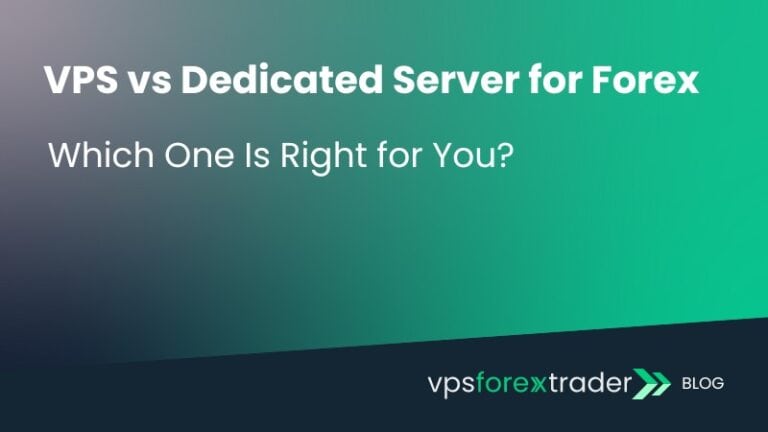Forex trading can be a great source of passive income, but having the right trading setup is essential for achieving success. Beginner traders usually start by using a home PC as their trading platform, but many soon find that a Virtual Private Server (VPS) offers a slew of added benefits for forex trading.
We’ve put together this comprehensive article that compares the two options. We’ll dive deep into the pros and cons of using a VPS versus a Home PC for forex trading, covering aspects such as speed, reliability, accessibility, security, and cost.
By understanding the differences between these two trading setups, you’ll be better equipped to choose one that best aligns with your trading strategies and goals.
Forex VPS Trading Setup
What is a Forex VPS?
A Forex Virtual Private Server (VPS) is a remote computer specifically designed for Forex traders. It’s a virtual machine hosted on a physical server, providing dedicated resources like CPU, RAM, and storage. A VPS operates independently from other users on the same server, ensuring consistent performance and a reliable trading environment.
Why use a Forex VPS?
Speed: In Forex trading, every millisecond counts. Forex Virtual Private Servers are typically hosted in data centers with high-speed internet connectivity and close proximity to major Forex brokers’ servers. This reduces latency, allowing you to execute trades faster and with minimal slippage.
Reliability: A good Forex VPS provider will have little to no downtime, which means that your trading platform remains connected to the market at all times. This helps prevent missed trading opportunities due to disconnections or other technical issues.
Scalability: A Forex VPS can easily be upgraded or downgraded to match your trading needs. As you expand your trading activities or require more resources, you can easily scale your VPS without affecting its performance.
Pros of using Forex VPS
Reduced latency: With a Forex VPS, your trades are executed more quickly due to its proximity to forex brokers’ servers and high-speed internet connections.
Minimal downtime: a good Forex VPS provider will ensure that your server remains online with minimal downtime, allowing you to capitalize on market opportunities 24/7.
Access to advanced trading tools: A Forex VPS can handle resource-intensive trading tools, such as Expert Advisors (EAs) and other automated trading algorithms, without slowing down or crashing.
Remote accessibility: A Forex VPS can be accessed from any device with an internet connection, allowing you to monitor and manage your trades from anywhere, at any time.
Enhanced security: Best forex VPS providers implement robust security measures, including firewalls, DDoS protection, and regular data backups, ensuring your trading data and activities remain protected.
Cons of using a Forex VPS
Additional cost: A Forex VPS comes with a monthly fee, adding to your trading expenses. However, this cost may be offset by the potential gains resulting from improved trade execution and reliability.
Technical expertise: Although most Forex VPS providers offer user-friendly interfaces and customer support, some degree of technical knowledge may be required to set up and manage your VPS.
Choosing the right Forex VPS provider
Selecting the right Forex VPS provider is crucial for ensuring a seamless trading experience. Consider these factors when making your decision:
Location: Choose a VPS provider with data centers located near your forex broker’s servers to reduce latency.
Resources: Make sure that the forex VPS provider of your choice offers sufficient resources (CPU, RAM, and storage) for your style.
Uptime guarantee: Opt for a provider with a high uptime guarantee to minimize downtime and maintain a stable trading environment.
Customer support: Regardless of the Forex VPS provider you choose, technical issues will happen at some point in time. As such, select a provider with responsive and helpful customer support to assist with any technical issues so that you don’t see any disruptions in your trading activities.
Price: Compare prices and features of different VPS providers and choose a plan that provides an adequate price-to-performance ratio for your style of trading.
Reputation: Assess the VPS provider’s reputation by looking at customer reviews and testimonials. Positive feedback from other traders can provide valuable insights into the provider’s performance, reliability, and customer support quality.
In summary, a Forex VPS trading setup offers numerous advantages, such as reduced latency, increased reliability, and access to advanced trading tools. A VPS comes with added costs and the need of having a certain degree of technical expertise, though.
Using a Home PC for Forex Trading
Understanding Home PC Forex Trading Setup
A Home PC Forex trading setup refers to using your personal computer or laptop to run trading platforms and tools. This option is popular among traders who prefer to trade from the comfort of their homes and have control over their hardware and software.
Why use a Home PC for Forex trading?
Control: With a Home PC setup, you have complete control over your hardware and software configuration, allowing you to customize your trading environment to your preferences.
Convenience: Using a Home PC for forex trading can be more convenient. You simply manage your trades from the comfort of your own home without relying on third-party services.
Pros of using a Home PC for Forex trading
Lower costs: A Home PC setup may have lower ongoing costs, as you don’t need to pay for a VPS subscription.
Customization: You have the flexibility to choose your preferred hardware, software, and trading tools.
Privacy: Using a Home PC for forex trading allows you to maintain full control over your data and activities, ensuring maximum privacy.
Cons of using a Home PC for Forex trading
Latency: A Home PC setup can have higher latency compared to a VPS. This is especially true if you are located far from your broker’s servers or have an unstable internet connection. This may result in slower trade execution and increased slippage.
Reliability: Home PCs may experience technical issues, power outages, or internet disconnections, which may lead to missed opportunities or financial losses.
Limited accessibility: A Home PC setup does not provide the same level of remote access as a VPS. Technically, you could connect to your PC through remote desktop access, but doing that with a VPS is way more convenient.
Resource limitations: Running resource-intensive trading tools, such as Expert Advisors or automated trading algorithms, can strain your Home PC’s resources, leading to reduced performance or system crashes.
Forex VPS vs Home PC Setup: Which Is Best For Your Trading Style?
When deciding between a Forex VPS and a Home PC trading setup, you have to weigh the pros and cons of each option in the context of your specific trading style. Here’s a breakdown of which setup might be better suited for various trading styles:
Scalping Traders: Since scalping involves executing multiple trades within a short time frame, speed and reliability are critical factors. A Forex VPS offers lower latency and higher uptime, which are essential for quick trade execution. Additionally, a VPS can handle resource-intensive tools, like Expert Advisors, that scalpers often use. Given these advantages, a Forex VPS is likely the better choice for scalping traders.
Day Traders: Day traders, who open and close trades within a single day, also require fast trade execution and low latency. A Forex VPS provides these benefits, along with remote accessibility, enabling day traders to manage their trades from multiple devices or locations. Considering these factors, a Forex VPS is likely a more suitable choice for day traders.
Swing Traders: Swing traders hold positions for several days or weeks, which means that latency might not be as crucial for them. A Home PC setup could be a viable option for swing traders, as it offers customization and privacy. However, if you need remote accessibility, a Forex VPS might still be the better choice.
Position Traders: For position traders, who hold trades for an extended period, performance and accessibility may not be as critical. A Home PC setup can provide a stable and reliable trading environment, as well as maximum privacy and control over data. If position traders do not require low latency or remote access, a Home PC setup might be sufficient.
Tips for optimizing your Home PC for Forex Trading
If you choose to use a Home PC for forex trading, consider these tips to optimize your setup:
Invest in a reliable computer: Choose a computer with sufficient processing power, memory, and storage capacity to handle your trading tools and strategies. As a general rule, look for a computer that has at least 8 GB of RAM and a CPU (central processing unit), a.k.a. processor, of at least 2.8 GHz.
Maintain a stable internet connection: Use a wired connection for improved stability and consider investing in a backup internet source to minimize downtime.
Keep your computer up-to-date: Regularly update your operating system and trading software to ensure optimal performance and security.
Use a UPS: Invest in an uninterruptible power supply (UPS) to protect your computer from power outages and voltage fluctuations.
In conclusion, using a Home PC for forex trading offers several advantages, including lower costs, customization, and privacy. However, it also has drawbacks, such as higher latency and lower reliability compared to a VPS. To maximize the benefits of a Home PC trading setup, you have to invest in reliable hardware and take steps to ensure a stable trading environment.
Conclusion
In summary, using a Home PC for forex trading offers several advantages, including lower costs, customization, and privacy. However, it also has drawbacks, such as higher latency and lower reliability compared to a VPS. To maximize the benefits of a Home PC trading setup, you have to invest in reliable hardware and take steps to ensure a stable trading environment.
What’s more, choosing between a Forex VPS and a Home PC trading setup depends on your trading style and its specific requirements. Each option has its advantages and disadvantages, and understanding them will help you make an informed decision. If you are looking to optimize your forex trading experience and achieve better results, Choose VPSForexTrader. We offer a range of high-performance VPS plans tailored for forex traders, providing the speed, reliability, and accessibility you need to excel in the forex market. Check out our Forex VPS plans today and discover the right VPS solution for your trading needs.












